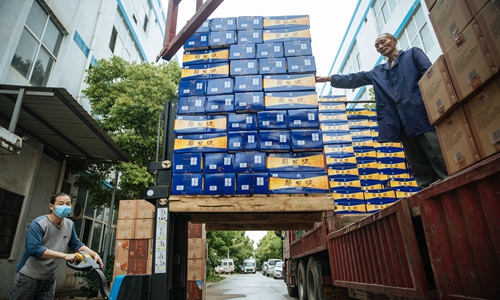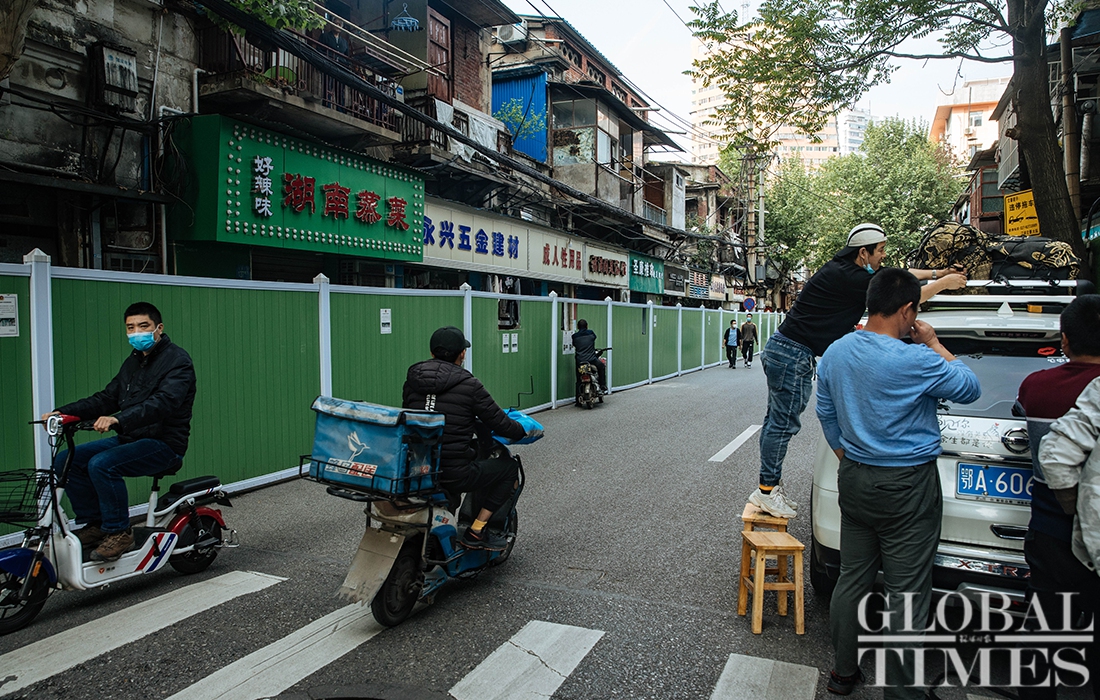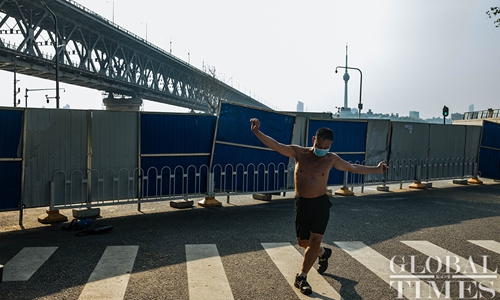Small firms healing wounds
By Zhao Yusha in Wuhan and Wang Cong in Beijing Source:Global Times Published: 2020/4/23 0:38:40
Wuhan businesses expect recovery after quarantine loosens

Two workers at a liquor factory in Baishazhou Small and Medium Enterprises Town in Wuhan, Central China's Hubei Province load and unload goods at the warehouse. The merchandise will be sent to supermarkets. Photo: Li Hao/GT
More than two weeks after Wuhan, Central China's Hubei Province, lifted a lockdown and embarked on the road to recovery, many small businesses in the city continue to be constrained by a slew of challenges, including slow business and closures due to lingering anti-epidemic efforts. Some small businesses owners are facing what they call "a life-and-death situation", but still keep the tenacity.
Wuhan, which has been billed a "city of heroes" for the massive sacrifice it took to stop the spread of coronavirus epidemic, once again emerged as remarkably resilient in face of the new challenges. Over the past few days, pictures of Wuhan residents lining up for jobs stood in stark contrast to people lining up for unemployment benefits in countries like the US. The challenges for many in Wuhan, which was under lockdown for 76 days, remain more dire than many places in China and around the world and they require more targeted policy support from the central and local governments, but ultimately the city will prevail once again, businesses owners and analysts said of the city.
'Life-and-death'
"We are now positioned in a 'life-and-death situation," Zhang Yong, who owns a ride-hailing company in Wuhan, told the Global Times. Zhang's company operates under China's biggest ride-hailing company Didi Chuxing and generates profits from car rental fees from drivers. "We did not earn a single penny when the city was placed under lockdown."
But that does not stop Zhang from extending a helping hand to others. He said he exempted rental fees for drivers, who also did not earn any income during the lockdown, in order to relieve any heavy burdens they shoulder, but the heavy finance blow then veered to him, which caused shortages of millions in cash flow.
While Zhang resumed work on April 4, other small businesses in the city continue to face certain restrictions as the city remains vigilant for a resurgence of the epidemic.
Dacheng Road located in central Wuhan was famous for its various delicacies, and it was a must-go for foodies who want to try good food. Only 30 percent of the street's restaurants were open when the Global Times reporter went to visit.
"Our restaurant has opened for a week now, but the business is bleak," said Huang Yinjun, who owns a restaurant on Dacheng Road. Huang said he receives only two to three orders from delivery platforms, which earns him around 300 yuan in daily income.
"This is far from enough to cover our daily expenses, including rent and electricity, totaling 600 yuan. The government's ban of dine-in services just added insult to injury," said Huang. Huang said he did not expect business to boom before quarantine restrictions are loosened in Wuhan, "as fear of the virus persists, Wuhan people prefer to eat at home. Workers, students and tourists, which used to be regular consumers in restaurants, won't come back soon."
"Although the city lifted its lockdown two weeks ago, many shops on Wuhan's streets remain closed… many shop owners are on the verge of bankruptcy," Dong Dengxin, director of the Finance and Securities Institute at Wuhan University of Science and Technology, told the Global Times on Wednesday.
That could exacerbate another challenge - rising unemployment - for the city, small businesses owned by individuals account for nearly 60 percent of the city's total of more 1.3 million business entities.
A manager from a Wuhan barbecue restaurant, who only gives his surname as Deng, told the Global Times that he has laid off 90 percent of employees in his restaurant after it resumed operation. "We used to have 60 employees here, but I keep only six employees now."
Deng said he is struggling to pay rent, buy food and electricity now, paying the salaries of another fifty people is beyond his capacity.
Zhang with the ride-hailing firm also said that many drivers could face unemployment. "We are now struggling to keep the company running. Once we went into bankruptcy, hundreds of those drivers will also be left jobless," Zhang said.

Photo: Li Hao/GT
Policy support
A rising unemployment rate, which is crucial both economically and in terms of social stability, has become a top priority for officials not just in Wuhan but also national leaders in recent weeks, which pushed forward a slew of policies.
On the central government level, officials lent trillions of yuan in extra loans to businesses, particularly small and medium-sized enterprises (SMEs) and are mulling more relief measures.
In Wuhan, the city government has raised a 20-billion-yuan special fund to 40 billion yuan to support business. The city has also given away 500 million yuan in coupons to spur consumption in hopes to spur business activities.
These favorable polices have helped some companies such as Wuhan Homsh Technology Co, an iris recognition intelligent semiconductor chip supplier, whose business was first hit by crippled supply chains due to the lockdown but now faces declining export orders.
"Thanks to the government's preferential policies, it is now easier to apply for a bank loan, and with much easier terms than previous years," Yi Kaijun, CEO of the company told the Global Times.
However, for many other businesses, the loans might not be sufficient to keep them afloat.
Zhang said that banks gave him a new preferential policy of postponing his loan term from the previous three months until May. But for him, this is of little help. "I cannot afford it even if they delayed the payment until August."
Zhang said he also applied for government subsidies but failed as it set thresholds for the company's tax payments and so forth.
Dong said that while businesses in the city need more support from the government, including soliciting help from big corporations to help out small businesses.

Photo: Li Hao/GT
Wuhan resilience
However, despite the mounting economic challenge, many in the city remain upbeat for the recovery path ahead, with many expecting a full recovery soon once the shadow of the epidemic recedes.
"As the virus has been put under control, along with government support policies, I believe business will return to normal in a short time," Yi said.
More than just support from the government, such confidence also comes from a tradition in the city and across the country regarding financial responsibility and great ingenuity.
"Unlike the US, Chinese people possess a positive tradition of saving money; most people's savings allow them to support themselves for at least half a year," Dong said, adding that businesses could also make use of online and delivery platforms to broaden their sales channels and their businesses will be boosted once Wuhan returns to normal in early May, when schools gradually open.
On Wednesday, a remark made by Chinese renowned respiratory scientist Zhong Nanshan saying "we've made it!" has been trending on Chinese social media, with many netizens believing after being through such darkness, Wuhan, as well as China is seeing light at the end of the tunnel.
Posted in: SOCIETY